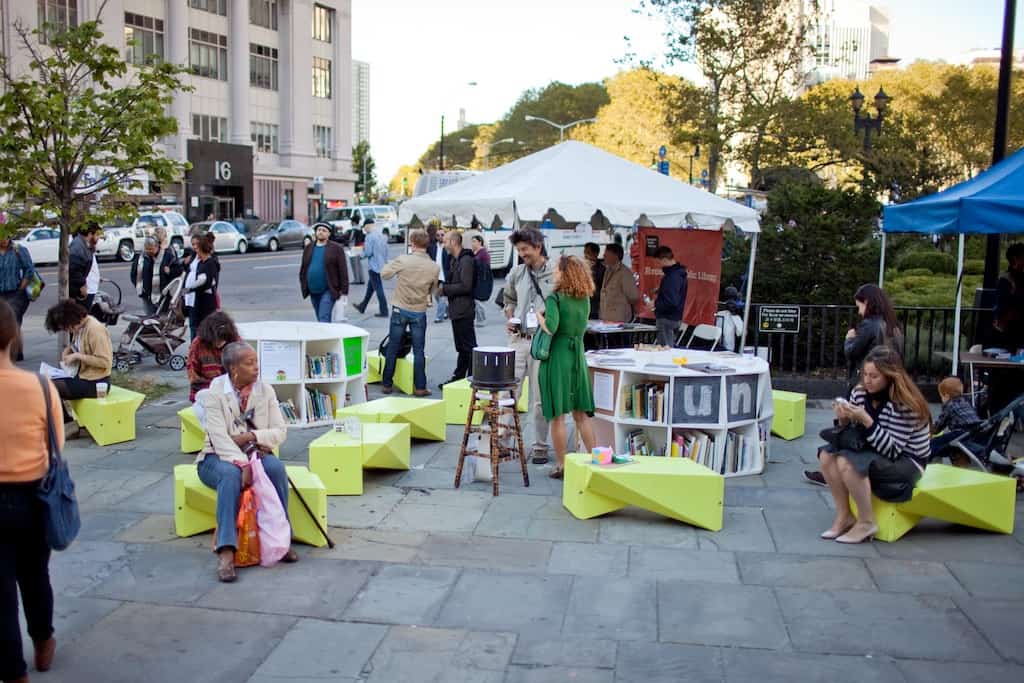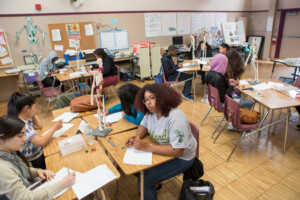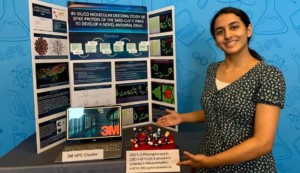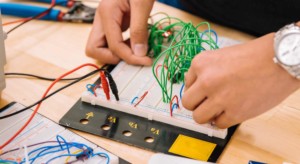STEM: Coming to a street near you?

I love science museums. There are some things you just can’t experience anywhere else – a giant dinosaur skeleton towering over you, or looking through cabinets after cabinet of life from around the planet. But museums have one major problem: they exist in one physical location. You need to get yourself to them and, when you do, you often need to fork over a certain amount of money to get it.
Science centers and natural history museums have various ways to extend their reach, from mobile learning labs (such as Pacific Science Center’s Science on Wheels) and portable “museum-in-a-box” programs (like the Burke Museum’s Burke Boxes) to science cafés, themed after hours events, and free days.
But the problem of access remains: for special events and free days, you still need to get yourself to the museum (and be prepared to “enjoy” it cheek to jowl with other visitors); mobile learning labs or museum boxes usually only serve school districts. Science cafés, which bring scientists and café- or pub-goers together to talk about science, are wonderful but rarely offer hands-on experiences or real objects to see and touch.
Enter a new breed of science-mobile. While pop-up museums are gaining popularity with cultural organizations from museums to Apple computers, projects like the Think Tank and the Uni Project (both in New York) are taking STEM to the sidewalks (and parks and libraries).
The Uni Project’s goal is to “temporarily transform almost any available urban space into a public reading room and venue for learning. We start with the conviction that books and learning should be prominent, accessible, and part of what we expect at street-level in our cities.” The project itself is made up of groups of cube-like shelves that can be unloaded from a truck and stacked in almost any urban space. The shelves are loaded with books that have been curated by area museums and libraries. The Uni is completely free – anyone passing by can borrow and book and a bench. The project has spread to several cities, including a STEM-themed Uni that will feature hands-on activities as well as books being launched by the Foundation for Early Learning and its community partners in Seattle, Washington. The STEM-themed Uni will travel around the state and will be set up in public spaces ranging from library community rooms to a downtown square.
The Think Tank, recently funded via the crowd-funding site Indiegogo, describes itself as “a mobile cognitive science lab and education station that will harness intrinsic interest in the human brain and mind to get disadvantaged and STEM-underrepresented kids hooked on science.” The Think Tank is a repurposed box truck topped with a pink brain that will feature “gateway” science fun including brainwave-reading headsets and games, technology that lets you “record neuronal spikes and control the movements of a live insect via its nerve cells,” and lab space where visitors can design and run their own experiments. While planning to take the Tank to schools and museums, the project’s video also mentions “sidewalk talks” delivered by “world-renowned thinkers in psychology and neuroscience” – here’s hoping they visit some public spaces other than schools and museums as well.
Another venture into mass accessibility for museums is the MOOC – Massive Open Online Course. The American Museum of Natural History, the Museum of Modern Art, and the Exploratorium all recently announced their new channels on MOOC-hub site Coursera. On the other hand, the Tate – well-known in the museum world for their digital education initiatives – decided against MOOCs as a viable venue for their education efforts.
But more on museums and MOOCs another time. Meanwhile, I enthusiastically await the results of mobile projects like the Uni and Think Tank. One-off projects are wonderful, but the next questions in many peoples’ minds will be: how effective are they? And are they scaleable? That remains to be seen.
Photos courtesy of the Uni Project
Disclaimer: The author is working with the Foundation for Early Learning to curate STEM activities for the Uni Cube.







0 Comments
Leave a Comment
Your email address will not be published. All fields are required.